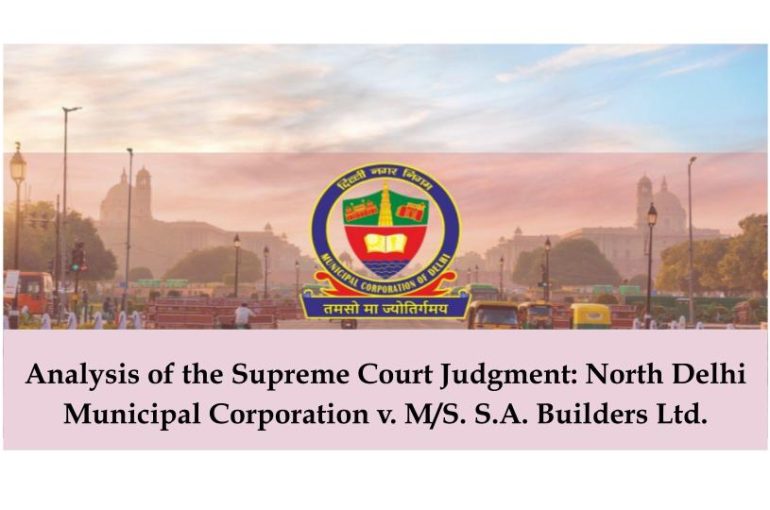Analysis of the Supreme Court Judgment: North Delhi Municipal Corporation v. M/S. S.A. Builders Ltd.
Introduction
In the case of North Delhi Municipal Corporation v. M/S. S.A. Builders Ltd., 2024 INSC 988 the Supreme Court of India dealt with complex issues surrounding arbitration, the powers of arbitral tribunals, and the interpretation of interest under the Arbitration and Conciliation Act, 1996 (“1996 Act”). The judgment has significant implications for arbitration jurisprudence, particularly regarding the award of interest.
Background
The dispute arose out of a construction contract awarded by the North Delhi Municipal Corporation (NDMC) to S.A. Builders Ltd. for building approaches to a flyover. Despite entering into a contract on November 11, 1983, the work could not be completed by March 1990 due to non-availability of the site, resulting in the closure of the project. The respondent submitted its final bill, which the appellant failed to pay, leading to arbitration proceedings.
The sole arbitrator, appointed under the Arbitration and Conciliation Act, 1940 (later governed by the 1996 Act), passed an award on December 16, 1997. The arbitrator awarded a sum of ₹1,70,40,720.80, along with simple interest at 18% per annum from April 1, 1990, until the date of actual payment.
Litigation Timeline
1. Execution Proceedings: After obtaining the arbitral award, S.A. Builders filed an execution petition. The Single Judge referred the matter to a Division Bench to determine the method of computing post-award interest.
2. Appeals: The appellant challenged the arbitral award under Sections 34 and 37 of the 1996 Act. Both challenges were dismissed, and the matter was brought before the Supreme Court.
3. Clarification by Arbitrator: The Division Bench allowed S.A. Builders to approach the arbitrator for clarification regarding the award of interest. The arbitrator clarified that post-award interest would be calculated on the total amount, including the pre-award interest. NDMC challenged this clarification, arguing that the arbitrator was functus officio (lacking jurisdiction after passing the award).
Key Issues Before the Supreme Court
1. Jurisdiction of Arbitrator: Whether the arbitrator could issue a clarification several years after passing the award.
2. Interpretation of Section 31(7) of the 1996 Act: Whether post-award interest can be levied on the sum comprising the principal amount and pre-award interest.
3. Res Judicata: Whether NDMC’s repeated challenges to the arbitrator’s jurisdiction were barred by the principles of res judicata.
Supreme Court’s Analysis:
- Jurisdiction of Arbitrator: The Court held that the arbitrator’s clarification was valid as the Division Bench had expressly permitted S.A. Builders to seek clarification. The limitation period under Section 33(1) of the 1996 Act could be waived by mutual consent or court direction. Since the Appellant’s challenge to this process had been dismissed at various stages, the arbitrator’s clarification was deemed lawful.
- Interpretation of Section 31(7): Section 31(7)(a) allows an arbitral tribunal to include interest in the “sum” awarded for the period between the cause of action and the award date. Section 31(7)(b) mandates that this “sum” shall carry post-award interest unless otherwise specified. The Court reaffirmed its earlier decision in Hyder Consulting (UK) Ltd. v. State of Orissa, (2015) 2 SCC 189 holding that the “sum” includes the principal amount plus pre-award interest. Therefore, post-award interest must be calculated on this aggregate amount.
- Res Judicata: The Court emphasized that NDMC’s repeated objections to the arbitrator’s jurisdiction were barred by res judicata. The issue had already been resolved in prior proceedings, and the Appellant could not reopen it under the guise of a fresh challenge.
Judgment
The Supreme Court upheld the respondent’s entitlement to post-award interest on the total sum, including pre-award interest, in line with the principles laid down in Hyder Consulting. The Court dismissed NDMC’s contentions and directed the Single Judge to compute the amount payable after considering the clarified award and the principles established in this judgment.
Significance of the Judgment
1. Clarity on Interest Awards: The judgment reinforces that post-award interest under Section 31(7)(b) applies to the total “sum”, including pre-award interest. This interpretation ensures fair compensation to claimants.
2. Limited Scope for Arbitrator’s Re-engagement: While the arbitrator’s jurisdiction is generally terminated after passing the award, this case illustrates exceptions where courts authorize clarifications.
3. Finality of Arbitration Proceedings: The decision underscores the importance of avoiding repetitive challenges, adhering to the principles of res judicata to ensure efficiency in arbitration.
Conclusion
The Supreme Court’s decision in North Delhi Municipal Corporation v. M/S. S.A. Builders Ltd. provides a crucial precedent on the interpretation of interest under the 1996 Act. It highlights the balance between judicial oversight and the finality of arbitration, ensuring that arbitration remains a swift and effective dispute resolution mechanism. The ruling not only clarifies legal ambiguities but also underscores the judiciary’s role in upholding the integrity of arbitral awards.
Shikha Pandey
Legal Associate
The Indian Lawyer





































Leave a Reply